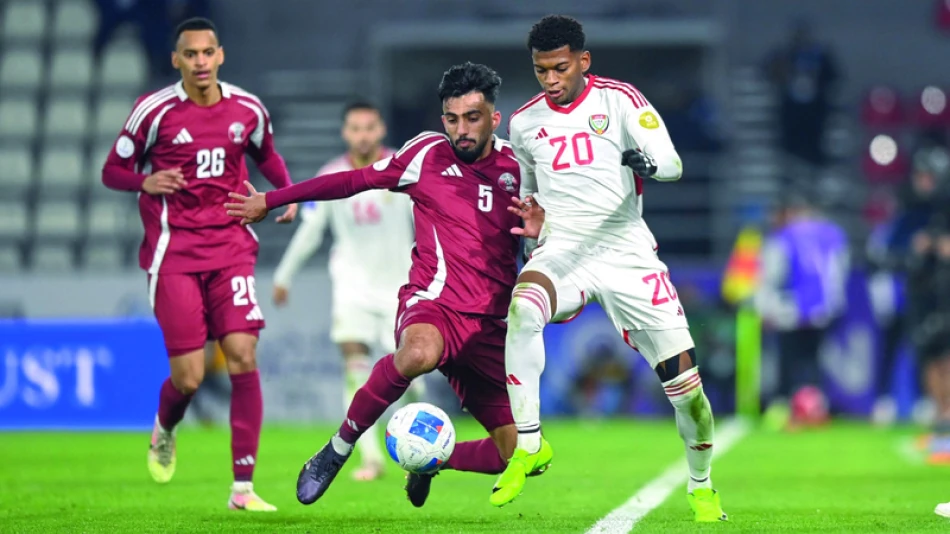
Bahrain's Playing Style Mirrors Qatar and Oman's Approach, Experts Analyze
UAE National Team Eyes Historic World Cup Qualification Through Strategic Preparation
The UAE national football team is positioning itself for what could be a historic breakthrough to the 2026 FIFA World Cup, with a carefully orchestrated preparation strategy that includes two crucial friendly matches against Syria and Bahrain in Dubai this September. As the team prepares for decisive World Cup playoff matches against Oman and Qatar in October, national team coach Eid Baroot believes the Emirates stands on the brink of achieving its greatest footballing ambition.
Dubai Training Camp: More Than Just Practice
The UAE Football Association has approved an intensive training program that sees the national team establishing a Dubai-based camp from August 25 through September 9. This strategic location choice isn't coincidental—Dubai's climate closely mirrors Qatar's conditions, where the crucial playoff matches will unfold.
Romanian head coach Olario Cozmin will use friendly matches against Syria (September 4) and Bahrain (September 8) at Al Wasl's Zabeel Stadium as final preparation tools. According to Baroot, these opponents were specifically chosen because their playing styles, particularly Bahrain's approach, closely resemble what the UAE will face against Qatar and Oman.
Technical Advantages of Strategic Opposition
The selection of Syria and Bahrain as sparring partners reflects sophisticated tactical planning. Both teams employ regional playing styles that will help Cozmin's squad adapt to the physical and technical demands they'll encounter in the World Cup playoffs. This approach mirrors successful preparation strategies used by other Gulf nations, where familiarization with regional football characteristics has proven crucial in high-stakes matches.
Building on Momentum from European Success
The team enters this critical phase with confidence boosted by recent victories during their Austrian training camp in July. Wins against Italian club Lecce (3-1) and Slovenian side Bravo (2-1) demonstrated the squad's improved technical capabilities and tactical cohesion under Cozmin's guidance.
These European victories carry particular significance because they came against teams with different playing philosophies than typically encountered in Asian football, suggesting the UAE has developed tactical flexibility that could prove decisive in playoff scenarios.
The October Crucible: Playoff Mathematics
The UAE faces a compact but intense playoff schedule from October 8-14 in Doha's Jassim bin Hamad Stadium. Matches against Oman and Qatar represent the culmination of years of development investment and tactical evolution under foreign coaching expertise.
Historical context makes these fixtures particularly significant. The UAE's last World Cup appearance came in 1990, making this 36-year gap one of the longest droughts among traditionally competitive Asian nations. Regional rivals like Saudi Arabia, Iran, and Japan have maintained more consistent World Cup presence, highlighting the magnitude of opportunity facing the Emirates.
Regional Competition and Tactical Evolution
The UAE's approach reflects broader trends in Gulf football development, where nations like Qatar (2022 World Cup hosts) and Saudi Arabia (significant recent investments) have elevated regional competition standards. This competitive environment has forced tactical sophistication that now positions the UAE as a legitimate contender rather than merely a hopeful participant.
Squad Depth and Strategic Selection
Cozmin's recent inclusion of five new players in the national team setup demonstrates confidence in domestic league development. The UAE Pro League's rising standards have produced technically capable players who can compete at international levels, creating genuine selection competition that strengthens overall squad quality.
This depth allows tactical flexibility crucial for playoff scenarios, where single matches can determine World Cup qualification. The ability to adapt formations and playing styles mid-tournament often separates successful qualifiers from disappointed near-misses.
Market and Investment Implications
World Cup qualification would generate substantial economic benefits for UAE football infrastructure and commercial partnerships. Regional precedents show that World Cup participation typically triggers increased sponsorship values, broadcasting rights premiums, and tourism-related revenue streams.
The UAE's position as a regional business hub means World Cup qualification could enhance the nation's sporting reputation in ways that extend beyond football, potentially influencing future hosting rights for major tournaments and international sporting events.
The Weight of National Expectation
Baroot's emphasis on playing "for the national team emblem" reflects the psychological pressure accompanying this historic opportunity. The convergence of tactical preparation, squad quality, and national support creates conditions that haven't aligned for the UAE in decades.
Success in October would validate years of systematic development and position the UAE among Asia's football elite. Failure, conversely, would likely trigger comprehensive reviews of development strategies and coaching philosophies, making these October fixtures genuinely pivotal for Emirati football's future direction.
Most Viewed News

 Sara Khaled
Sara Khaled






